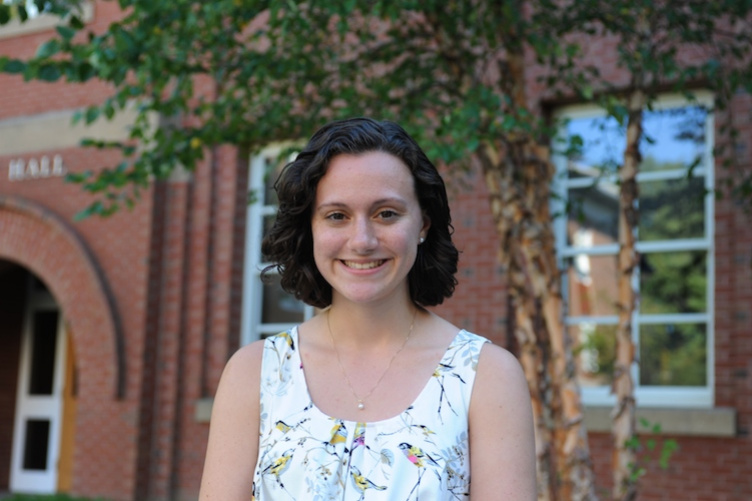
Samantha Brand ‘17
Sometimes research bumps up against real life. In the case of Samantha Brand ‘17, that collision was set in motion in 2015 when she decided to apply for a Summer Undergraduate Research Fellowship through the UNH Hamel Center for Undergraduate Research. Earlier this year, Brand, now a graduate student whose field is occupational therapy, presented her findings at a conference in Chicago.
The title of her research is a long one but it tells the story: “Through My Eyes: The Effect on Family Life of Having Siblings with Autism Spectrum Disorder as Experienced by a Typically Developing Adolescent.” Brand’s 19-year-old brother has the disorder. For years, they attended the same public school.
“I was interested in finding out if other people had similar or different experiences than I’ve had, and if their family activities or routines were affected by someone who had autism,” Brand says. “I’ve always had an innate curiosity about being able to sit down and talk with someone to see if I’d think, ‘Yes, I can totally relate to that.’”
While much has been written on the subject from the perspective of parents, she found little from the viewpoint of siblings, especially adolescents.
For her research, Brand turned to a set of 16-year-old triplets from western Massachusetts. To protect their identities, she uses the names Ellen, Ben and Kevin. Ben and Kevin are on either end of the autism spectrum; Kevin is higher functioning and Ben, who is nonverbal and uses an iPad to communicate, exhibits the repetitive motion behavior associated with lower functioning individuals — rocking and hand flapping, for example.
“I’ve always had an innate curiosity about being able to sit down and talk with someone to see if I’d think, ‘Yes, I can totally relate to that.’”
Their parents are divorced and they live with their mother, but their father is involved in their lives; at one time he coached a hockey team that Ellen and Kevin played on, with Ben as his assistant. All three attend the same public school.
In addition to interviews with Ellen, Brand set up a family activity with the siblings and their mother so she could witness their interactions. They went bowling. What Brand discovered supported the conclusion of one study she found that stated siblings of individuals with a disability often have high levels of empathy, patience and social competence and a strong self-image.
“Ellen was a good go-between for her brothers,” Brand says. “Kevin was go, go, go all the time. Ben got a little anxious and sat rocking and shaking his hands. Ellen kept checking to make sure he was OK,” Brand says.
She appeared to be very close to each of her brothers, Brand noted. Through their interviews, she learned that Ellen helped Kevin advocate for himself in school, and served as a translator for Ben when he needed help communicating.
Both brothers have epilepsy. When Ben had a seizure during the bowling outing, Ellen and her mother jumped into action. Kevin hid under a table. As soon as she knew Ben was safe, Ellen went to get Kevin, pulling him out from his hiding spot and assuring him that his brother was alright.
“The way Ellen responded was so natural; she seemed to know instinctively what they both needed,” Brand says. “She was only 16 and she was dealing with all this better than most adults.”
As she analyzed her observations, the brothers’ diagnoses and personalities, and Ellen’s interactions with the boys, Brand found that while there were disruptions to the activity, the routines and relationships remained consistent.
“Ellen was so insightful; she was nothing but positive,” Brand says. “She was incredibly supportive and she got support from her brothers, too. It was amazing and endearing to see.”
In the last phase of her research, Brand followed up with Ellen months later and learned that she is looking toward college, where she plans to major in special education.
“To see her take her life experience in that direction is pretty powerful. It’s very much what I have done and why I chose OT,” Brand says. “For me it’s simple: You have to accept other people for who they are without giving it a second thought. Everyone deserves that.”
Interested in summer research? Learn more here.
-
Written By:
Jody Record ’95 | Communications and Public Affairs | jody.record@unh.edu



















































